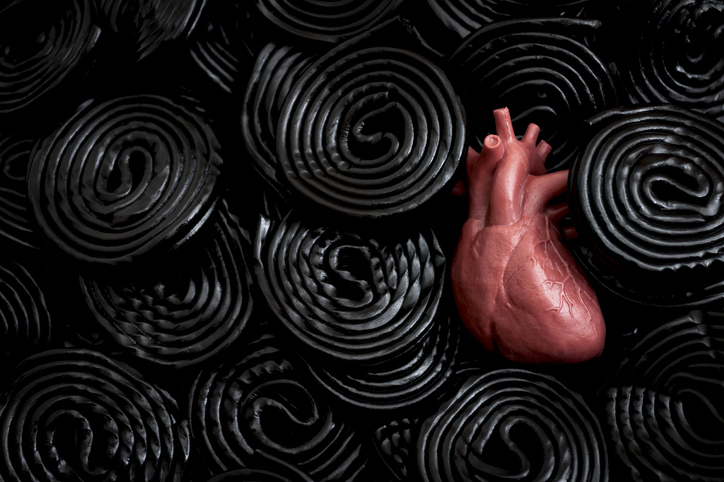Yes, Licorice Can Be Lethal!

By Joy Stephenson-Laws, J.D., Founder
They say everyone has a vice. Black licorice candy was the vice of a Massachusetts construction worker who reportedly ate a bag and a half of this candy every day. And, unfortunately, it was a vice that ended up costing this man his life.
According to one report, “Eating a bag and a half every day for a few weeks threw his nutrients out of balance and caused the 54-year-old man’s heart to stop, doctors reported.”
“Even a small amount of licorice you eat can increase your blood pressure a little bit,” said Dr. Neel Butala, a cardiologist who was referenced in the report.
When I first read this story, I was shocked and wanted to investigate if there were any other stories similar to this one. Turns out, back in May of 2019, an 84-year-old man in Canada “overdosed” on licorice tea, according to this Live Science report.
Drinking too much licorice tea caused his blood pressure to raise to dangerously high levels. He also experienced headache, sensitivity to light, chest pain, fatigue and swelling in his calves. At the emergency room, he was treated with “several medications” in order to lower his blood pressure, and “his symptoms improved over the next 24 hours.”

“He collapsed while having lunch at a fast-food restaurant. Doctors found he had dangerously low potassium, which led to heart rhythm and other problems. Emergency responders did CPR and he revived but died the next day,” according to the report referenced earlier.
Potassium is an essential mineral that works with sodium to balance the fluid and electrolytes in the body. Potassium also helps keep blood pressure under control and may help reduce kidney stones and bone loss as you age. It may even reduce your risk of stroke. To give you a bit more perspective on how critical this mineral is to our overall health and functioning, our muscles need potassium to contract, and our heart muscles require potassium in order to beat properly and regulate blood pressure. Most adults need about 4,700 mg of potassium per day.
Black licorice contains a compound called glycyrrhizin. This compound is what gives licorice its sweet taste, but it is also a compound that can cause potassium levels to drop.
“If you’re 40 or older, eating 2 ounces of black licorice a day for at least two weeks could land you in the hospital with an irregular heart rhythm or arrhythmia,” reports the U.S. Food & Drug Administration (FDA).
“Glycyrrhizin can cause potassium levels in the body to fall. When that happens, some people experience abnormal heart rhythms, as well as high blood pressure, edema (swelling), lethargy, and congestive heart failure.”
To be clear, licorice root (also called liquorice) is a plant in its natural form.
“Licorice root has a long history of use, going back to ancient Assyrian, Egyptian, Chinese, and Indian cultures. It was used traditionally for treating a variety of conditions, including lung, liver, circulatory, and kidney diseases,” reports the National Institutes of Health (NIH).
“Today, licorice root is promoted as a dietary supplement for conditions such as digestive problems, menopausal symptoms, cough, and bacterial and viral infections. Licorice gargles or lozenges have been used to try to prevent or reduce the sore throat that sometimes occurs after surgery. Licorice is also an ingredient in some products for topical use (application to the skin).”
There are even licorice root dietary supplements with the glycyrrhizin removed that are available, but taking a licorice root supplement, drinking licorice tea or consuming licorice in general is definitely something you want to discuss with a competent healthcare professional if you are taking any medications, have a history of heart problems or high blood pressure and are over the age of 40.
Licorice can interact with certain medications, and we always want to try to avoid drug interactions. Some sources also recommend that people with a G6PD deficiency avoid licorice.
I really think the biggest takeaway from this is that moderation is so important to practice. It may seem harmless to eat something such as candy in excess. After all, it’s not like it is drugs or alcohol. But the reality is that we really have to be mindful about what we are putting into our bodies on a daily basis. Nutrient balance is so important and as we can see in some cases can be a matter of life or death. You always want to try to avoid nutrient imbalance, and one of the best ways to do this is to limit processed foods such as licorice candy and consume a natural, whole foods diet with plenty of fresh fruits and vegetables.
Some delicious, whole foods that are rich in potassium include:
- Avocado
- Sweet potato
- Spinach
- Watermelon
- Black beans
- Beets
- Pomegranate
- Bananas
- Lentils
- Broccoli
- Cantaloupe
- Almonds
Consider taking routine nutrient tests in order to identify any nutrient imbalances or deficiencies that you may have. The truth is most of us do! The good news is that once these are identified, a competent healthcare professional can work with you to make the necessary dietary changes and recommend quality supplements if necessary.
Enjoy your healthy life!
Disclaimer: This article is not intended to provide medical advice. Please consult with your doctor or another competent healthcare practitioner to get specific medical advice for your situation.
The pH professional health care team includes recognized experts from a variety of health care and related disciplines, including physicians, attorneys, nutritionists, nurses and certified fitness instructors. This team also includes the members of the pH Medical Advisory Board, which constantly monitors all pH programs, products and services. To learn more about the pH Medical Advisory Board, click here.







